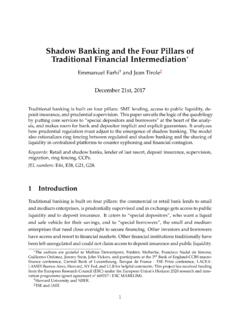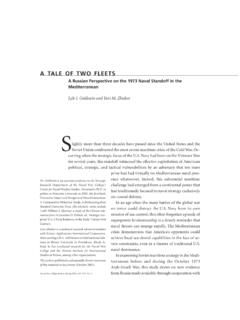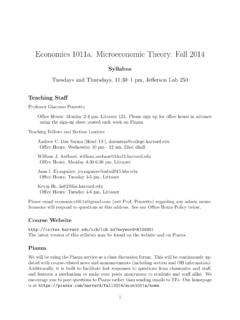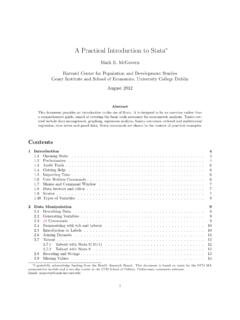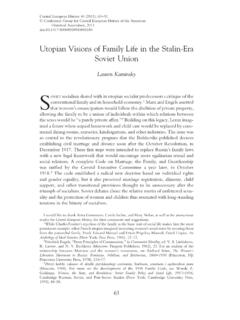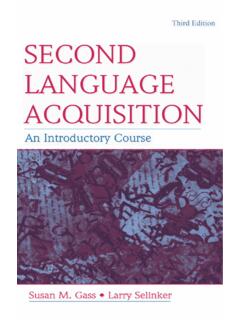Transcription of What is language - Harvard University
1 What is language ? Introduc)on To Linguis)cs Adam Szczegielniak Learning Goals What do we know when we know a language Crea)vity in language Competence/Performance What is Grammar language Universals language Development language and Thought What is language ? The ability to use language , perhaps more than any other attribute, distinguishes humans from other animals But what does it mean to know a language ? Linguistic Knowledge When you know a language , you can speak (or sign) and be understood by others who know that language Five-year-olds already know their first language (s) The ability to use a language requires profound knowledge that most speakers don t know that they know Cant help but use language Try to not understand what I am saying Just as impossible as trying not to be fooled by op)cal illusions You cannot stop blinking or having peripheral vision For example.
2 Rota)ng Snakes the circular snakes appear to rotate spontaneously in your peripheral vision as a result of the peripheral driM illusion. No)ce how the movement stops when you look directly at a collec)on of concentric circles. The illusion is probably caused by unconscious rapid eye movements and blinking Knowledge of the Sound System When we know a language , we know what sounds (or signs) are used in the language and which sounds (or signs) are not This also includes knowing how the sounds of the language can be combined Which sounds may start a word Which sounds may end a word Which sounds may follow each other within a word Knowledge of sound system Knowing the sounds of your language also involves knowing how your face looks ahwen you produce them Mcgurk effect hear da da, but what is pronounced is ba ba.
3 But lips move to ga ga McGurk effect Knowledge of Words Knowing a language also means identifying certain strings of sounds as meaningful words Most words in all languages are arbitrary connections of sound to meaning hand main nsa ruka (English) (French) (Twi) (Russian) History of words Knowing a language does not mean we know its history or the etymology of words. Many words of English have a common ancestor with similar words in other languages Languages changes so there will always be proto- languages The structure of protolanguages dies with its speakers.
4 Ancestral Protolanguages One way we can tell if languages are genetically related is if they have a large number of sound correspondences Where an English word begins with an f, the corresponding word in French and Spanish begins with a p: English /f/ French /p/ Spanish /p/ father p re padre fish poisson pescado From these correspondences, we can hypothesize that Indo-European had a /p/ since more related languages have the /p/ form, and that at some point the /p/ became /f/ in the Germanic group This does not mean that a modern speaker of English has this knowledge as part of her gramamar Knowledge of Words The conventional and arbitrary relationship between form and meaning is also true in sign languages From Poizner, Howard, Edward Klima, and Ursula Bellugi.
5 What the Hands Reveal about the Brain Figure: "Arbitrary relation between gestures and meanings of the signs for 'father' and 'suspect' in ASL & CSL" Copyright 1987 Massachusetts Institute of Technology, by permission of the MIT Press Knowledge of Words Sound symbolism: there are some words whose pronunciation seems to reflect the meaning Onomatopoeia: English cock-a-doodle-doo and Finnish kukkokiekuu English gobble gobble and Turkish glu-glu English gl and the concept of sight: glare, glint, gleam, glitter, glossy, glance, glimpse but there is also gladiator, glucose, glory, glutton, globe, etc. Creativity of Linguistic Knowledge Every language has an infinite number of possible sentences Knowing a language enables you to: Create a sentence that has never been uttered before Understand a sentence that has never been uttered before Most sentences we use are new.
6 Very few sentences are stored in our brains Knowledge of Sentences and Nonsentences language is more than a set of words because words must be ordered in certain ways to create sentences Our knowledge of language allows us to separate possible sentences from nonsentences What he did was climb a tree *What he thought was want a sports car Linguistic Knowledge and Performance Knowledge: what we know about a language (linguistic competence) Mostly unconscious knowledge about sounds, structures, meanings, words, and rules for combining linguistic elements Performance: how we use this knowledge in actual speech production and comprehension We can theoretically create an infinitely long sentence, but physical constraints make this impossible In speech we stammer, pause, and produce slips of the tongue What Is Grammar?
7 Grammar = the knowledge speakers have about the units and rules of their language Rules for combining sounds into words, word formation, making sentences, assigning meaning When a sentence is ungrammatical in a linguistic sense, it means that it breaks the rules of the shared mental grammar of the language Descriptive Grammar Descriptive grammar: a true model of the mental grammar of language speakers In other words, a descriptive grammar describes the linguistic rules that people use when they speak their language The point of view of a descriptive grammarian is that grammars from every language and dialect are equal Prescriptive Grammar Prescriptive Grammar.
8 Attempts to prescribe what rules of language people should use to speak properly The view of a prescriptive grammarian is that some grammars are better than others During the Renaissance, a middle class of English speakers wished to talk like the upper class, so they started buying handbooks that told them how to speak properly Bishop Robert Lowth s A Short Introduction to English Grammar with Critical Notes (1762) Prescriptive Grammar Lowth decided that two negatives makes a positive, therefore people should not use double negatives Despite the fact that everybody was already using double negatives in English (and communication was just fine) Despite the fact that many languages of the world require the use of double negatives Dialects Prescrip)ve Grammars usually argue for a standardized dialect.
9 Regional forms or forms restricted to group class are frowned upon Dialects have grammars Rules are systema)c The Standard Standard American English (SAE) is the dominant (or prestige) dialect in America Nobody actually speaks SAE (it s an idealization), and it is not defined precisely When a standard is the dialect of the wealthy and powerful, people may be required to speak that dialect in order to get ahead Ross (1954) noticed differences in the speech of British upper class (U) and non-upper class (non-U) speakers Non-U speakers wanted to sound U, and U speakers wanted to avoid non-U speech Non-U speakers often hypercorrected, or deviated from the norm thought to be proper English The Standard Every dialect is equally expressive, logical, complex, and systematic All dialects represent a set of rules or lexical items in the minds of speakers, and any value judgments on dialects are social judgments British received pronunciation (RP)
10 Omits r in certain environments and is considered the standard pronunciation In the American northeast, dialects that omit the r are considered to be substandard and the prestige dialect maintains the r What is considered a prestige dialect has a social basis, not a linguistic one Dialect - Lexical Differences Regional dialects may also differ lexically British: lift American: elevator British: pants American: underpants Boston: tonic Los Angeles: soda Los Angeles: freeway New York: thruway New Jersey: parkway England: motorway Dialect- Phonological Differences There are systematic pronunciation differences between American and British English For example, Americans put stress on the first syllable of a polysyllabic word, and British speakers put the stress on the second syllable in words like cigarette, applicable, formidable, laboratory Americans may pronounce the first vowel in data as [e] or [ei] but vast majority of British speakers would only use [e] Dialect - Syntactic Differences Appalachian English has several syntactic differences from Standard English Double modals You might should go home.


